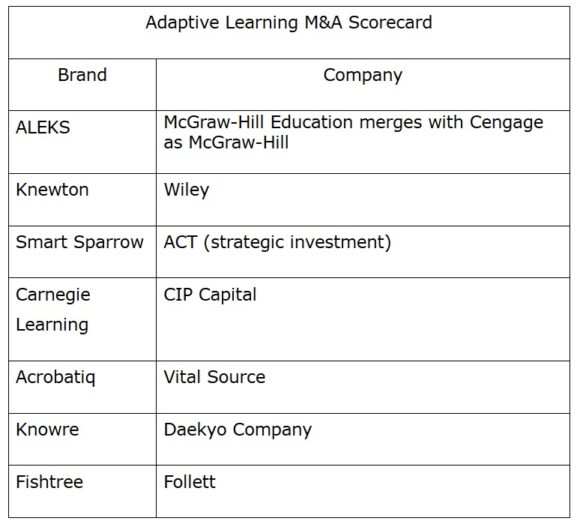Dear Commons Community,
A colleague of mine, Bob Ubell examined the “largely unacknowledged but inevitable consolidation” in the adaptive learning industry in an opinion piece for Inside Higher Education. Above is a brief box score of adaptive learning companies (on the left) and their acquirers (on the right). The simplest definition of adaptive learning (also referred to as personalized learning) is the delivery of custom learning experiences that address the unique needs of an individual through just-in-time feedback, pathways, and resources rather than providing a one-size-fits-all learning experience.
Here is an excerpt from Bob’s piece:
“Why is the adaptive industry house cleaning now, sweeping up some early, promising start-ups?
“Companies like Knewton and others went straight into black-box algorithms, assuming mastery of what learning data actually means and how students learn,” observed Hill in an email message. “Their customers were really venture capitalists, not academic programs with real teachers and students.”
The biggest lesson is that inventing whiz-bang software is not nearly enough. To succeed, vendors must assemble an adaptive Rubik’s cube, snapping four essentials securely in place. The central one, of course, is brilliantly crafted technology, coupled with a deep reservoir of high-quality content, integrated with shrewd assessment tools, embedded with skilled teacher training at each site — all at scale to secure market share, sustainability, profits and plugged-in implementation at every campus. Not trivial.
While some were good at this or that, few pulled it all together. The biggest handicap for many is their thin content libraries. In his prescient insight, Bill Gates wrote in his famous 1996 essay, “Content Is King,” “Content is where I expect much of the real money will be made on the internet.”
One thing start-ups didn’t need was arrogance, especially trumpeting extravagant claims. In 2013, five years after Jose Ferreira launched Knewton, he boasted in Time that there will be only one company in the world capable of succeeding at adaptive learning. “I think it’s going to be us because we’re so far ahead now.”
None achieved significant scale, except McGraw-Hill’s ALEKS, a math and chemistry tutoring system, and its sister product, SmartBook. ALEKS reports 4.5 million unique users in K-12 and higher ed courses. Since 2010, it has generated 8.7 billion interactions. In humanities, social sciences, science and business, the company claims 11.8 billion interactions since 2009. McGraw-Hill offers more than 800 titles for adaptive users.
It turns out that adaptive systems are neither the best thing since sliced bread nor half-baked. Like much of ed tech, adaptive research results can be ambiguous, with some saying the software is marginally better than classroom instruction, while others report impressive results.
Alfred Essa, vice president of analytics and data science at Macmillan, says that “in some domains, well-designed adaptive tutors are on a par with human tutors.” A truly remarkable feat. Until recently, Essa was head of research at McGraw-Hill.
The ironic denouement is that an old-line publisher, founded at the end of the 19th century, more than 130 years ago, outwitted high-tech upstarts, countering modern corporate trends in which whiz kids leave the old guard in the digital dust. Curiously, Knewton, an adaptive falling star, is now in the hands of Wiley, another venerable publisher, founded more than 200 years ago in 1807.”
Good information here for those who want to keep up with the dynamic world of instructional technology.
Tony



